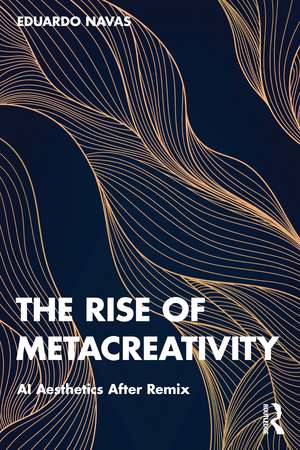The Rise of Metacreativity: AI Aesthetics After Remix
Autor Eduardo Navasen Limba Engleză Paperback – 18 noi 2022
In order to understand the complexity of authorship and originality in relation to creativity in contemporary times, Navas combines historical and theoretical premises from different areas of research in the arts, humanities, and social sciences to provide a rich historical and theoretical context that critically reflects on and questions the implications of artificial intelligence and machine learning as an integral part of creative production. As part of this, the book considers how much of postproduction and remix aesthetics in art and media preceded the current rise of metacreativity in relation to artificial intelligence and machine learning, and explores contemporary questions on aesthetics. The book also provides a thorough evaluation of the creative application of systematic approaches to art and media production, and how this in effect percolates across disciplines including art, design, communication, as well as other fields in the humanities and social sciences.
An essential read for students and scholars interested in understanding the increasing role of AI and machine learning in contemporary art and media, and their wider role in creative production across culture and society.
| Toate formatele și edițiile | Preț | Express |
|---|---|---|
| Paperback (1) | 273.18 lei 3-5 săpt. | +20.62 lei 4-10 zile |
| Taylor & Francis – 18 noi 2022 | 273.18 lei 3-5 săpt. | +20.62 lei 4-10 zile |
| Hardback (1) | 892.48 lei 6-8 săpt. | |
| Taylor & Francis – 18 noi 2022 | 892.48 lei 6-8 săpt. |
Preț: 273.18 lei
Nou
Puncte Express: 410
Preț estimativ în valută:
52.28€ • 54.38$ • 43.16£
52.28€ • 54.38$ • 43.16£
Carte disponibilă
Livrare economică 25 martie-08 aprilie
Livrare express 08-14 martie pentru 30.61 lei
Preluare comenzi: 021 569.72.76
Specificații
ISBN-13: 9780367753047
ISBN-10: 0367753049
Pagini: 280
Ilustrații: 11 Line drawings, black and white; 11 Illustrations, black and white
Dimensiuni: 152 x 229 x 27 mm
Greutate: 0.4 kg
Ediția:1
Editura: Taylor & Francis
Colecția Routledge
Locul publicării:Oxford, United Kingdom
ISBN-10: 0367753049
Pagini: 280
Ilustrații: 11 Line drawings, black and white; 11 Illustrations, black and white
Dimensiuni: 152 x 229 x 27 mm
Greutate: 0.4 kg
Ediția:1
Editura: Taylor & Francis
Colecția Routledge
Locul publicării:Oxford, United Kingdom
Public țintă
Postgraduate, Professional, and Undergraduate AdvancedNotă biografică
Eduardo Navas is Associate Research Professor of Art and Digital Arts & Media Design in the School of Visual Arts, and Research Faculty in the College of Arts and Architecture's Arts & Design Research Incubator (ADRI) at Pennsylvania State University, where he researches and teaches principles of cultural analytics and digital humanities. Navas is the author of Remix Theory: The Aesthetics of Sampling (2012), Art, Media Design, and Postproduction: Open Guidelines on Appropriation and Remix (2018), and Spate: A Navigational Theory of Networks (2016). He is co-editor of The Routledge Companion to Remix Studies (2014), Keywords in Remix Studies (2017), and The Routledge Handbook of Remix Studies and Digital Humanities (2021).
Cuprins
Metacreativity Part I: Interstitial Paradigms 1. Labor 2. Modularity 3. Memory 4. Technology 5. Compression 6. Simulation 7. Environs Part II: Meta Paradigms 8. Art 9. Music 10. Media 11. Culture 12. History Part III: Metacreativity 13. Principles of Metacreativity 14. AI Aesthetics After Remix 15. Conclusion: Tripartages
Recenzii
“[A] must-read text for all those interested in the emerging relationship between AI and art […] placing it within a historical and theoretical framework rooted in our cultural, political, and economic past. […] Navas’s book is undoubtedly an important step forward in the AI debate, and the notion of metacreativity a valuable tool.”
Francesco D’Isa, Los Angeles Review of Books
Francesco D’Isa, Los Angeles Review of Books
Descriere
This book brings together history and theory in art and media to examine the effects of artificial intelligence and machine learning in culture, and reflects on the implications of delegating parts of the creative process to AI.
